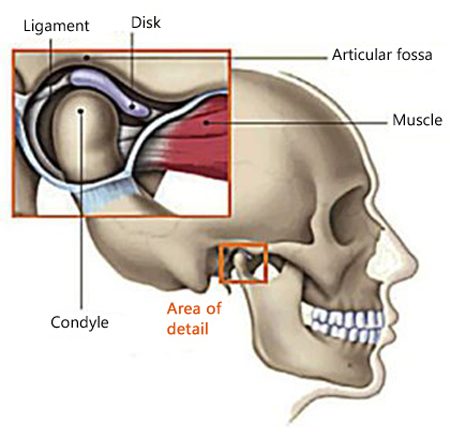
Temporomandibular joint (TMJ)
The TMJ is the temporomandibular joint—a rotating and sliding joint that connects the side of your skull to your lower jawbone. TMJ disorder or dysfunction occurs when the joint is damaged, worn, or inflamed. Estimates show that 12 percent of the U.S. population, or about 35 million people, are affected by TMJ disorder. What are the causes and symptoms? Can TMJ be prevented?
What Causes TMJ Disorder?
Although the cause of TMJ dysfunction in some cases can be complicated and sometimes even obscure, certain factors are associated with it, including:
- Arthritis (rheumatoid and osteoarthritis)
- Stress
- Injury or trauma to the jaw or neck
- Malocclusion caused by a poorly fitting dental filling or crown
- Misaligned bite
- Teeth shifting because of the failure to replace extracted teeth
- Teeth grinding (bruxism) or clenching
- Sustained or repetitious habits, including cheek sucking, nail biting, lip biting, or poor posture
TMJ Symptoms
There are many symptoms of TMJ disorder. You don’t have to experience all of them to be affected by the disorder.
- Difficulty closing teeth together
- Dizziness
- Earaches
- Eye pain or blurred vision
- Facial pain or numbness
- Headaches
- Jaw popping, or clicking, or locking
- Neck pain
- Painful chewing
- Ringing in the ears
- Tooth pain
Preventing TMJ
If your bite is misaligned and left untreated, you might begin to experience TMJ symptoms. Dr. Thomas will register and evaluate your bite. He will ask you to bite down on a piece of mylar color-transfer paper to register your bite. It will reveal if there are places where your upper and lower teeth are meeting in such as way as to cause trauma to the teeth or pain.
Treatment of TMJ Disorder
There are a wide range of treatments that could be used to relieve TMJ disorder, from very simple to highly complex. After carefully gathering information about your problem, Dr. Thomas will recommend what will be appropriate for your case. In some cases, he may start with simple solutions to see if they work and, if they don’t, move to more involved treatments.
- A simple bite appliance can be made to help adjust the resting position of your jaw.
- Medications can be used to help combat the stress that triggers TMJ pain or relieve arthritis in the joint.
- Heat treatments to the jaw joint and associated muscles can sometimes provide some relief.
- Reshaping your teeth (occlusal equilibration) can sometimes help them meet in a more harmonious bite.
- For serious problems, a full-mouth reconstruction may be needed to repair complex bite problems and restructure the way your teeth come together.
- Orthodontic treatment can sometimes help.
- In some cases, surgical intervention may be needed.
You can avoid the pain and discomfort of TMJ disorder. Call us to schedule an appointment for an exam with Dr. Thomas or complete our Request an Appointment form.


